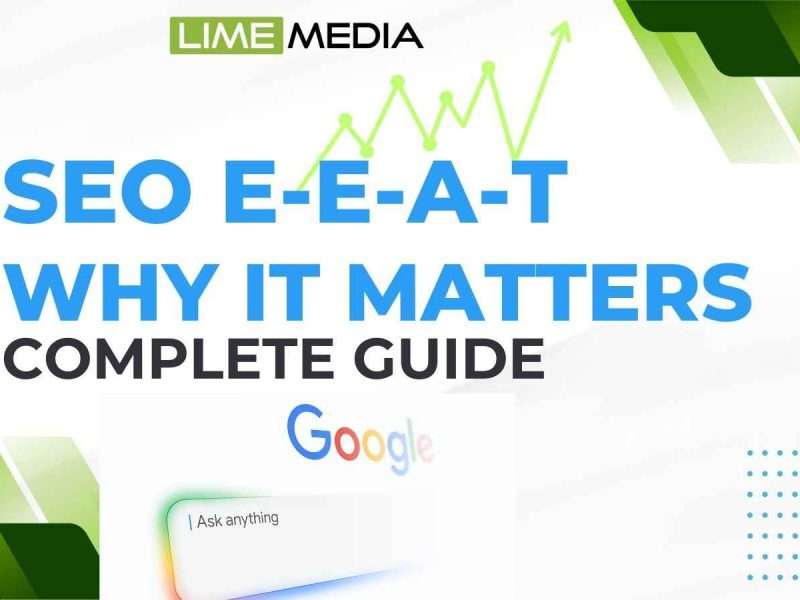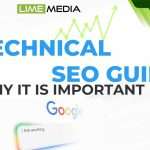When people think of E-E-A-T, what they may not realize is that E-E-A-T has become a large component of brand strategy in addition to how the information is presented on blogs and sites.
These guidelines from Google of Search Quality Evaluator/Rater Guidelines, which in turn you can see your site do better and reach out to audiences on Google as well as AI platforms like ChatGPT, Gemini, Perplexity, or Copilot, and also social media apps like TikTok and Instagram.
This complete guide is written by Ayaz Ahmad Head of Digital Marketing at LimeMedia.org, where he will go over what E-E-A-T is today, how to present it on your digital platforms, why it plays a vital role in AI based search, and he also goes into practical steps to see how you can implement E-E-A-T it in your business to improve your SERP rankings in digital world.
Table of Contents
What is E-E-A-T?
E-E-A-T is abbreviation of E=Experience, E=Expertise, A=Authority and T=Trust.
We use to determine how well our written content in results matches what users are looking for and what information we’ve provided on our website by following Google’s Search Quality Rater Guidelines.
E= Experience: It is about your experience, that you have or experience persons you have in your company.
E= Expertise: It is about the expertise, knowledge, and experience in the relevant field of your organization and the people who represent your company.
A= Authority: It is about the reliability and trust of the source recognition.
T= Trust: Trust comes when you have Experience, Expertise, and Authority
Keep in mind that E-E-A-T is not a direct ranking factor; it serves as a framework that Google (and AI tools) use to determine which brands to feature because of the provided information.
The Role of Google’s Search Quality Rater Guidelines
To get into E-E-A-T, first read up on the Google Quality Rater Guidelines.
These guidelines help you create quality content that looks alike and help you to identify which search results are relevant and which are not.
Google’s improvement of its algorithm.
The quality rater guide is within the 180-page document, and we have that covered for our large global audience. While their input may not directly play a role in your site’s ranking, we do take their feedback into account in which we adjust our algorithms.
In simple terms: If you want to rank well in SEO today, your site had better have content that these raters want, which means to put out strong E-E-A-T.
Why E-E-A-T Matters in SEO?
Google is out to make its online users’ experience one that they can trust. That’s what E-E-A-T is all about.
As your site shows off a proven track record, professional skill set, and strong authority that is well earned, people are more likely to trust you. Your website can get the following results:
- More clicks from search results.
- More time spent on your pages.
- Improved interaction, which includes sharing or coming back.
Google uses all of these as indicators.
Think of it this way: Just as you would turn to a doctor for health advice over a random stranger, so Google is out to have users trust websites that prove they are reliable.
E-E-A-T: What Does It Mean for SEO?
As for what makes a quality source, E-E-A-T does that and more. In the real world, we tend to turn to authority figures for info and advice, which is why we should do the same online.
Google aims to provide accurate information to users. For that which is to do well in search engine results pages and get to the top of the rankings, you must show E-E-A-T.
Let’s break down each part: Let’s go over each point:
- Experience: Does the author have experience with the subject, topic, or in the field? For example, a food blog which reports on dishes the author has actually prepared is more valuable than that which is0 which is a rehash of someone else’s words.
- Expertise: Is the author an expert in this field? A certified lawyer who writes on legal rights displays that they know.
- Authority: Do other people look at this brand or author as a leader in their field? For instance, if other reputable sites link to your content, you gain authority.
- Trust: Can this info be true? Is the site secure, transparent, and honest? Trust is the foundation of the other three.
When you have these four elements working as a team, your content’s citation increases, which includes not only Google Search but also AI GEO (Generative Engine Optimization), which gives out direct answers.
Why E-E-A-T Matters for Google
First, Google used the term E-A-T (Expertise, Authoritativeness, Trustworthiness). Then they added a fourth E for Experience.
Among the four issues at hand, Trust is the most. Google has put forth that what people get accurate answers to is of great importance, especially for health, money, and safety-related issues. These are what they term as Your Money or Your Life (YMYL) topics.
In simple terms, If you provide facts and stats from real-world experience, in-depth knowledge, authority, and instill trust in the audience, you are more likely to rank well.
1. Experience Living knowledge.
Experience is what you have in fact done yourself.
Example: A restaurant review that is of value is one that was written by a customer who dined at the restaurant, not a person who is just copying from other reviews.
How to Show Experience
Add in stories of when we solved a client’s problems.
Present examples, include screenshots, and share testimonials.
Write from experience instead of theory.
Why it matters: AI can put out words, but they do not have experience. That’s what makes your content stand out.
2. Expert in the field who has great in-depth knowledge
Expertise is having in-depth knowledge of your subject.
Example: If you’re going to give parenting advice, Google finds it more helpful when you have experience of which major parenting websites we’ve published to and also working pro at a professional level in this field. Also, we see that parents are more likely to trust your advice when it is backed up by your experience at well-known parenting sites and your professional background. We also note that having a proven track record on large parenting platforms and professional experience in the field will increase how much faith parents put in your advice. When we look at which experts to listen to for parenting tips, we notice that those who have written in big parenting media outlets and also have a professional background in the area do get more trust from parents. Also, we see that to really be a trusted voice in parenting advice, you should have had success which has been published in large-scale parenting websites, and also to boot that up with professional experience in the area.
How to Show Expertise
Add author information, which includes a brief biography.
- Mention qualifications or certifications.
- Include the author’s social and professional networks.
- Use schema.org data, which is what Google recognizes.
Why it matters: Readers trust that an expert has written the article.
3. Authority To become the go-to source
Authoritativeness is what we recognize as the quality of a very reliable and credible player in your field.
Example: A government site is the go-to for passport renewal info, while a local cafe is the authority on what we serve.
How to Show Authority
- Cover in depth (develop topics into clusters).
- Gain links from trusted sites.
- Develop your personal or brand identity in your field.
Why it matters: As you build trust with your audience as a source, you will see higher search rankings for competitive topics.
4. Trust of Primary Importance.
Trust is the base upon which all else builds. Without it, what we bring to the table, like experience, expertise, authority, is void.
Example: If you are looking for tax advice which is reliable, you would turn to an accountant instead of a hobby blogger.
How to Build Trust
- Be open (about the author of the content).
- Present true information from reliable sources.
- Display customer reviews, ratings or testimonials.
- Use of secure connections (HTTPS) and easy access to contact info.
Why it matters: People and Google will not stay long on a site they don’t trust.
Levels of E-E-A-T (From Low to High)
Google’s Quality Rater Guide, which includes a range of E-E-A-T Levels:
1. Lowest in E-E-A-T: Spammer, deceptive, or harmful sites.
2. Low Info: Content which is out of the creator’s knowledge (e.g., a food blog posting on taxes).
3. Medium EEAT: Which is to say good enough content that fulfills its function but doesn’t really stand out.
4. High in EEAT: Which is to say sites that display great experience, expertise, authority, and trust.
5. Best E-E-A-T: We see that content that has high value, like news sites, government pages, or expert blogs, is rated as best E-E-A-T.
Strive for perfect E-E-A-T by constantly putting out helpful, accurate and in-depth content.
Demonstrate E-E-A-T in Your Content
You need to keep in mind that SEO is responsible for providing what is needed to meet E-E-A-T criteria but what is that and how do you prove experience, expertise, authoritativeness and trustworthiness?
The positive news is that which most dedicated website admins, SEOs and marketing teams are already doing what it takes for E-E-A-T.
Here is how companies may present E-E-A-T in their online presence:
1. Add in Author Backgrounds and Qualifications.
- Show who wrote the article.
- Include qualifications, experience, or certifications.
2. Use examples from the real world.
- Share examples of our work, personal anecdotes, or what we have heard from our customers.
3. Cited by other authors.
- Build out your backlink profile with quality sources like trusted sites, news outlets, and research organizations.
4. Keep it transparent.
- Add privacy info, disclaimers, and business details.
5. Maintain current content.
- Out-of-date information decreases trust. Update statistics, methods, and examples.
6. Support your claims with data.
- Use of reliable sources, research, or industry standards.
By engaging in these practices, your brand is told to search engines and AI systems that you are reliable.
Why Google’s E-A-T is key for AI in search and geo optimization.
AI, which includes ChatGPT, Gemini, Grok and Perplexity, is transforming how we find info online. Instead of directing to separate sites, they put together info into answers.
This is why E-E-A-T has greater importance.
Because AI models use reliable and citeable information in their answers. If your content is strong in terms of E-E-A-T it is more likely to be:.
- Picked up by AI responses.
- Linked back to your site.
- Trusted by those who use AI-generated answers.
Here is what GEO does. It is a framework for optimizing your content for AI-based engines. Also, at its core GEO relies very much on E-E-A-T principles. I have shared a comprehensive guide about GEO (Generative Content Optimization), where you will learn How to optimize content for GEO, and also, I’ve shared the GEO Content Audit Template with you, so check these out.
Tools That Improve E-E-A-T
Sometimes we look beyond what is on your site, we also see the importance of having data, insights, and proper tracking to prove out your claims, and for all we need some trusted tools that help us to improve E-E-A-T.
Here are some tool suggestions:
These platforms also report on lead quality, customer journeys, and attribution, which in turn allows you to prove your brand’s authority with real data.
- Microsoft Clarity: Helps to analyze how users interact with your site via heat maps and session recordings.
- GA4 + Google Tag Manager: Make sure to track all conversions, which in turn will prove the effectiveness of your campaigns.
When in combination with strong content, these tools present a full picture of experience, expertise and trustworthiness.
How LimeMedia.org Helps You With E-E-A-T
At LimeMedia.org which is what we do best is to develop SEO and PPC strategies that put your brand forward. Here’s what we do to prove E-E-A-T:
- Professional Content Creation: Expert authors’ blogs, guides, and case studies which are based in real-world experience.
- Conversion Setup: We have integrated tools like GA4, HubSpot, GHL, Zoho, and Clarity which in turn measures all user actions.
- SEO & GEO Optimization: Structuring your site for Google Search and AI answers.
- Authority Building: We help our projects in publishing PRs, creating backlinks, and social proof strategies, which make your brand more citable.
Are you ready to take your brand to the next level in terms of trust and visibility? Contact LimeMedia.org today and we’ll work together to establish your authority.
FAQs
1. What is E-A-T in SEO?
It’s a framework of Experience, Expertise, Authority and Trust which we put forth to prove out content’s reliability and rank worthiness.
2. Is E-A-T a ranking factor?
Google and AI systems which in turn affect your site’s performance.
3. What can small businesses do to improve E-E-A-T?
By the use of author bios, customer stories, reviews collection, and also from citations of trusted sites.
4. What does E-E-A-T do for AI in search?
AI platforms that present accurate and well-organized info in their responses. If your brand has strong E-E-A-T your brand is more likely to appear.
5. Can tools such as HubSpot and Zoho improve in that regard?
Yes. They report on customer interactions which in turn prove that your business is for real, is trusted, and is effective.
Final Thoughts
SEO is in constant flux. From AI to which geographic regions are targeted, what used to be a set of guidelines with E-E-A-T is now the base of digital trust.
If your brand is to rank high, present in AI search results, and gain customer trust, you must put out content that exudes experience, expertise, authority and trust.
At LimeMedia.org, we work with brands to design, improve, and grow their online presence, which we do with the help of E-E-A-T principles and data-driven tools. Build trust with your audience and AI users instead of just going after rankings.



